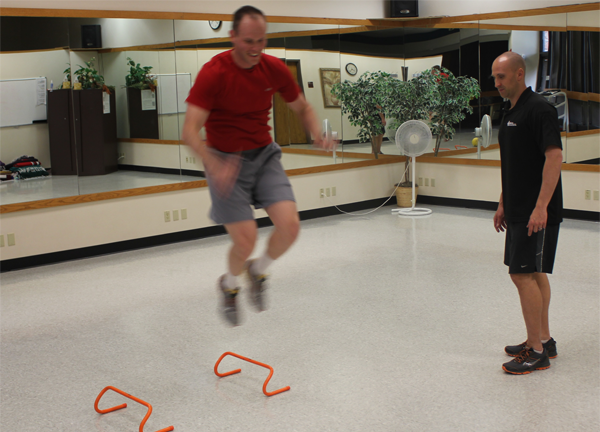Dawes leading new exercise program for UCCS police
Police officers face particular challenges when taking care of themselves.
Shift work, irregular hours, poor eating habits and a propensity to pick high-intensity exercise programs top the list, according to Jeremy Simenson, police officer in UCCS’s Department of Public Safety.
“Many law enforcement officers are adrenaline junkies,” Simenson said recently. “This causes them to choose extreme training programs for which many lack the requisite movement skill or strength to complete these programs safely.”
But thanks to a cooperative arrangement with a Beth-El College of Nursing and Health Sciences faculty member, UCCS police officers are getting more fit using an exercise program custom-designed to meet their needs.
Jay Dawes, assistant professor, worked with the department to create short, intense workouts. The routines can be done at any time of day and take into account the burden of specialized gear and equipment worn by officers. Special attention also is given to the explosive nature of many essential job tasks required to perform their jobs. Many times officers must go from sedentary activities such as sitting in a patrol car, to a situation where a pursuit and restraint of a person may be necessary.
“Normally, police officers carry about 25 additional pounds of equipment in duty gear,” Simenson said. “For specialty officers, that number can be 40 to 80 pounds.”
Dawes devoted part of his academic career to researching law enforcement needs and developing fitness programs designed for them. He previously worked with the Corpus Christi, Texas, Police Department, and is currently assisting in the development of several health, fitness and performance training initiatives with the Colorado State Patrol.
“I have really enjoyed working with this population,” Dawes said. “Many of the physical demands required for them to be successful are similar to athletes, however in many cases the cost of success is much higher, potentially life or death. These men and women often sacrifice their own personal safety and well-being to protect the public and it has been an honor and privilege to help them be more occupationally fit for duty.”


